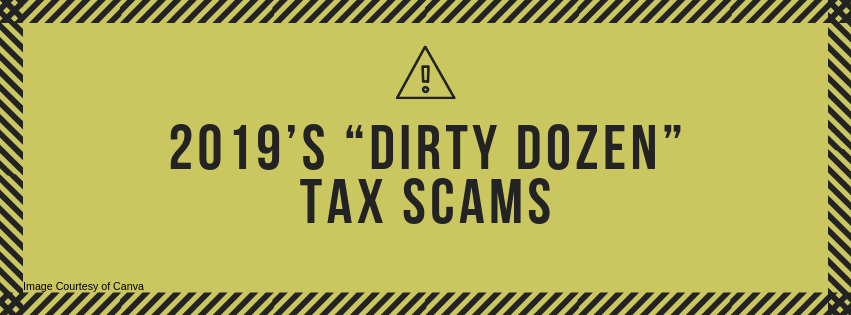In what’s now an annual tradition, every year around tax filing season, the IRS releases a briefing on the latest tax scams taxpayers should lookout for, as well as modern developments in the strategies used by fraudsters.
These 12 scams – affectionately titled the “Dirty Dozen” and known as the most aggressive, prolific schemes encountered by the IRS – are as follows:
1) Phishing
The IRS has set rules of initial contact with a taxpayer, so as such, any email you receive regarding a tax debt or refund may be safely disregarded as fake. If an email claims to be from the IRS, simply ignore and delete it, avoiding opening any links or responding with personal information.
The same can be said of any fake websites established. There’s only one IRS site, and that’s IRS.gov, so any other link – even if it’s only a keystroke’s difference – is a scam.
2) Phone Scams
Arguably one of the most effective scams out there, phone calls from those claiming to be IRS officials or other tax authorities, threatening jail time, fees, or even deportation over supposed tax dues, has victimized millions to tax fraud.
And yet, similar to phishing, the IRS will never make initial contact with a taxpayer over the phone, but rather via mail notice. So, if you receive a call from a person claiming to be from the IRS, simply hang up and report the incident to proper authorities.
3) Identity Theft
It makes sense to be vigilant about protecting all aspects of your identity, but now more than ever the IRS encourages it, as they are seeing a rise in tax return fraud from scammers who are filing tax returns with stolen Social Security numbers.
4) Tax Preparer Fraud
While most tax professionals are honest, knowledgeable, and looking to help, it should be said not all are ethical, and one should always judge shrewdly when choosing a tax preparer. Some accountants scam their clients through tax return fraud, identity theft, and other harmful strategies, so if something doesn’t feel right, follow your gut.
5) Refund Claims
One warning sign for fraudulent tax preparers, is if they charge a percentage based off your refund amount, promise a higher refund without even examining your financials, or ask you to sign your return before it’s filled out.
6) Falsified Income
Another scam tax preparers may pull is encouraging their clients to falsify income or living situations to qualify for better tax credits. As the taxpayer is legally responsible for what their return says, however, it’s the taxpayer and not the preparer who will be slapped with heavy fees for any inaccurate returns.
7) Higher Deductions
The IRS receives tax returns with inflated deductions and expenses all the time, as taxpayers overstate financial information in the hopes of receiving a higher return. And yet, these “white lies” are actually fraud, which comes with it’s own set of steep penalties and legal fees when it’s inevitably found out.
Avoid the temptation, and report the truth.
8) False Business Credit Claims
Just like with reporting higher deductions, taxpayers should avoid claiming credits that don’t apply to them – such as the research credit or fuel tax credit. Such business credits apply to only a select few and if the IRS sees too many credits claimed, they’ll suspect tax fraud.
When in doubt over eligibility, check “no” or seek the help of a tax preparer.
9) Fake Charities
The number of charitable donations increases closer to tax season, and scammers know this – often establishing fake charities to steal an unsuspecting taxpayer’s money. Double check the organization’s legitimacy through tools provided on IRS.gov, and if the organization’s name is similar to one that’s well known, chances are it’s a sham.
10) Offshore Tax Avoidance
If the number of criminal cases involving offshore tax avoidance proves anything, it’s that it’s only a matter of time before the IRS discovers that hidden bank account or source of income. Save yourself in jail time, legal fees, and heavy tax penalties by coming forward voluntarily to catch up on your tax dues.
11) Frivolous Tax Arguments
If you think you can avoid paying your taxes by taking an unreasonable claim to court, you’re wrong. The IRS honors legitimate claims or mistakes, but any frivolous tax argument or return will face a heavy fee of $5,000 for wasting the court’s time.
12) Tax Shelter Abuse
Last but not least, abusing tax shelters, like syndicated conservation easements or trusts, is another complex tax avoidance scheme the IRS is cracking down on.
Bottom line, if someone offers a deal that seems too good to be true, or your gut is trying to tell you something, listen and play it safe. You’re legally responsible for your own tax returns, so be smart and be safe – always seeking a second opinion or double checking with the IRS.
